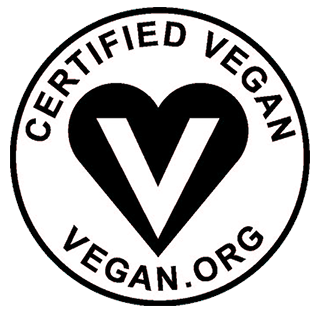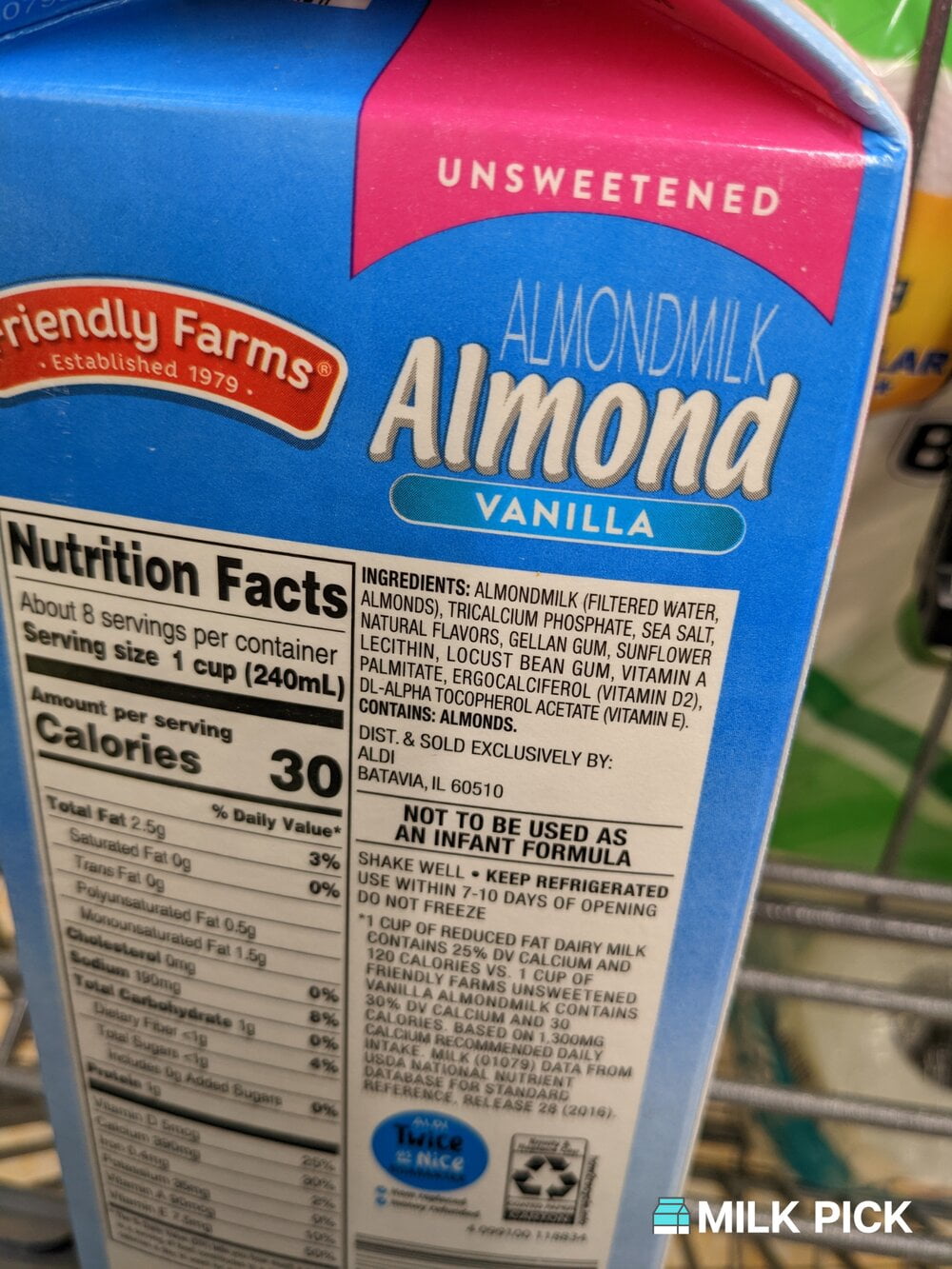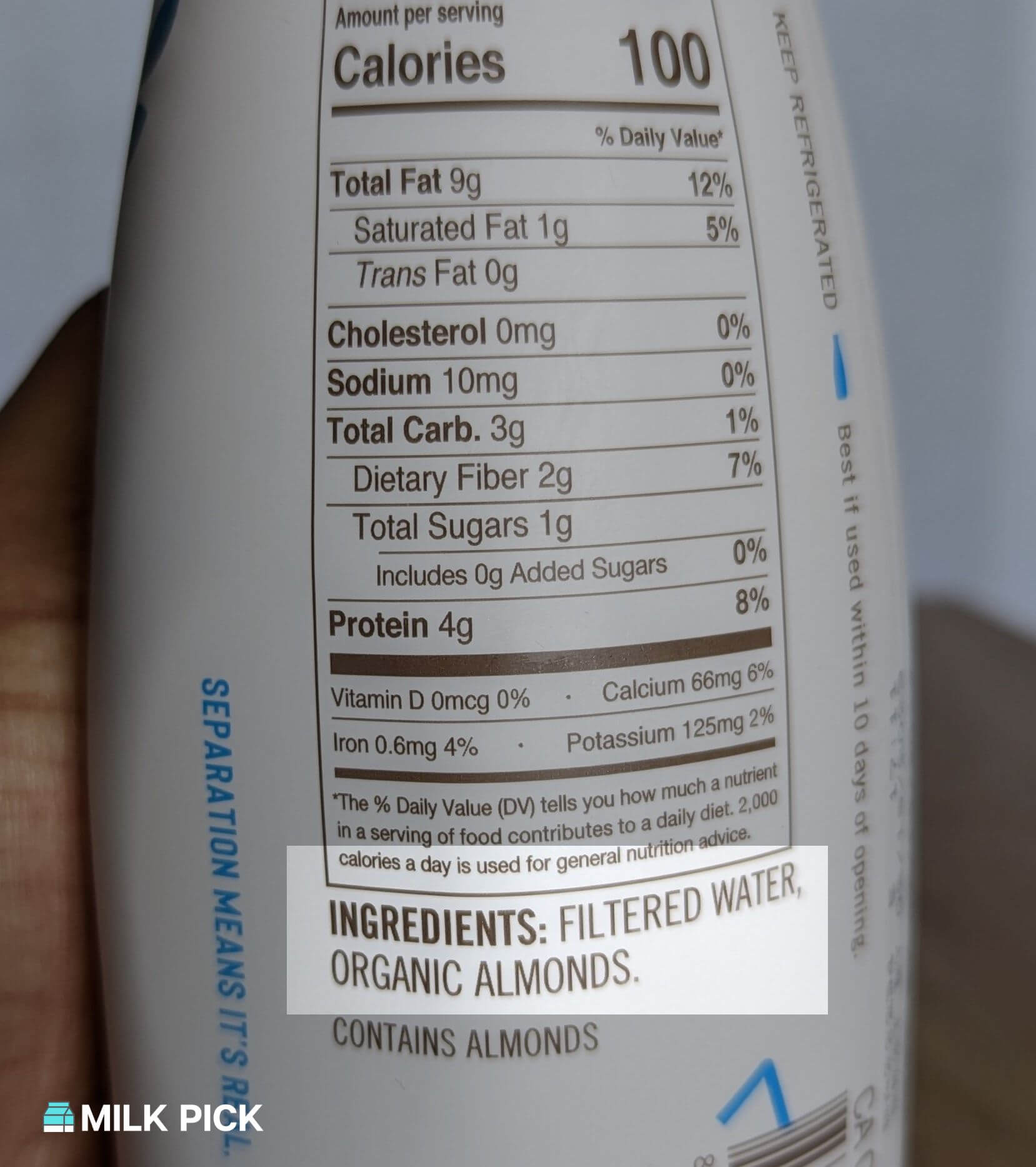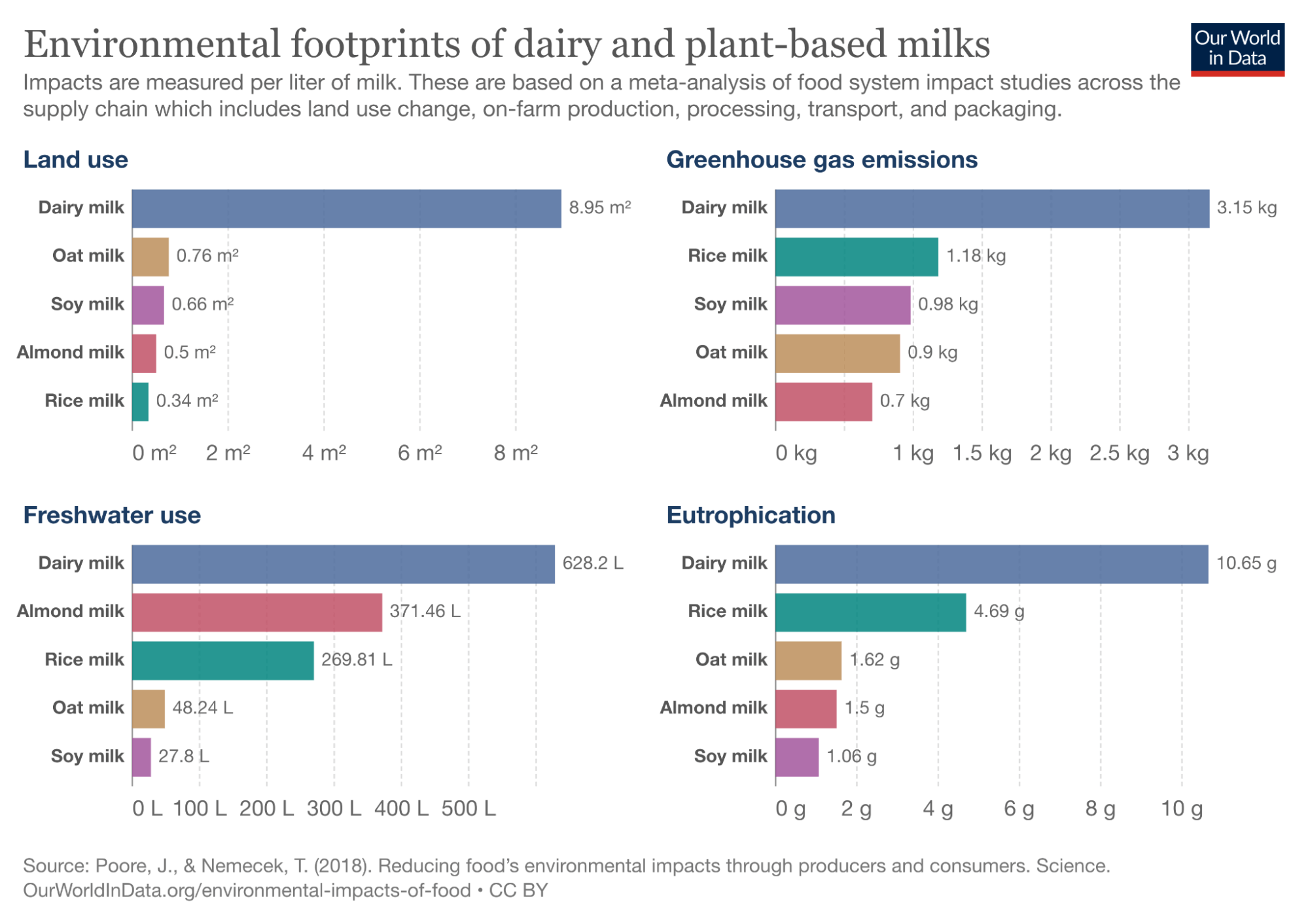Almond milk is a plant-based beverage that is the most popular alternative to dairy milk, especially for those following a vegetarian or plant-based diet.
The beverage’s low-calorie, low-fat nutritional profile, and creamy texture make it an excellent substitute for dairy in many baking recipes and in foods like cereal or coffee.
For someone on a vegan diet, it's important to know if a plant-based product like almond milk is 100% vegan or contains animal-based ingredients that vegans have committed to avoiding.
Understanding whether almond milk's ingredients and manufacturing process align with your values is essential for following a vegan lifestyle.
Read on to learn if almond milk is considered vegan and how you can choose a certified vegan brand for your diet.
Quick Answer
Is almond milk vegan?
Yes, almond milk is vegan and does not contain dairy. Almond milk is made from almonds and water. However, you should check the ingredient list to ensure store-bought almond milk doesn't contain animal products or byproducts as additives.
What is Veganism?
Veganism refers to a lifestyle, including diet and buying habits, that avoids using or consuming animal products or by-products.
It's a more strict form of vegetarianism, a diet that eliminates meat and focuses on fish and plant-based foods.
Modern “official” veganism began in 1944, when the Vegan Society was formed in Leicester, England.
The group’s founders sought to exclude the use of animal products in all areas of life, including cosmetics, clothing, and food.
The vegan movement grew in popularity throughout the 1960s.
Today, around 4% of the U.S. population follows a vegan lifestyle.
Vegans avoid all animal products and by-products in the foods they consume.
This means, in addition to not eating meat like poultry, beef, or pork, vegans do not consume any items that are tested on or made from animals or animal-by products, such as dairy milk or gelatin.
What Makes a Product Vegan?
For a food product to be considered vegan, it must not contain any animal-derived ingredients.
Animal ingredients include:
- Dairy, like yogurt, milk, and cheese
- Eggs
- Honey or beeswax
- Casein, a protein found in dairy milk
- Sweeteners that are processed or filtered with bone char
- Gelatin
- Fish and shellfish
Animal-derived additives like Vitamin D3, which is typically made from fish oil, or lecithin, an emulsifier that can be made from egg yolks
To determine if a product is vegan, you can read the nutritional label to look for these types of ingredients.
Because vegans also consider processing and manufacturing processes, you may want to read through a company’s website to determine if they meet your personal standards for veganism, including certifications and environmental standards.
Vegan Certification
A few different organizations in the U.S. do Vegan certification for foods, similar to Kosher certification for the Jewish community.
The most common is Certified Vegan, which is administered by Vegan Action and certifies that the product follows a strict set of standards for vegan classification.
The logo has a circular shape with a white background and features a large white “V” within a black heart with the words “Certified Vegan - Vegan.org”.

Is Almond Milk Considered Vegan?
From most perspectives, almond milk is an ideal option for vegans looking for a dairy milk substitute.
Almond milk is made from two basic ingredients: almonds and water.
Almonds are nuts that grow on the Prunus dulcis tree, making them a 100% vegan ingredient.
Some recipes call for emulsifiers, sweeteners, or a pinch of salt, but these are optional based on your preferences or those of the manufacturer.
To make almond milk, all you need to do is soak a cup of almonds in water overnight.
Then, rinse them off, put them in a high-speed blender with about a cup to two cups of water, and blend. Strain out the pulp, leaving you with a slightly creamy, nutty-flavored “milk”.
This process doesn’t involve the use of animal products, making the end product vegan-friendly.
It also doesn’t involve using or exploiting animals, another element that’s important to those who practice a vegan lifestyle.
Why is Almond Milk Called “Milk”?
Although the resulting liquid made from blending almonds and water is called "almond milk", it does not contain any dairy.
Most manufacturers label almond and other plant-based beverages as “milk” because they want to associate the nutritional profile, texture, and taste of dairy milk with what is essentially a mixture of nuts and water.
Additionally, almond milk is called milk because you can use it in many of the same ways as dairy milk, including:
- As a delicious drink
- On cereal
- In baking recipes
- In cooking as part of a sauce
- To make ice cream
- As a creamer in coffee or tea
Some non-dairy milk brands refer to their products as "mylk" to avoid confusion.
Are There Any Reasons That Almond Milk Wouldn't Be Considered Vegan?
Most almond milk brands are vegan.
Some almond milk manufacturers have vegan certification and place the logo on the cartons; however, many organic brands simply state the product is vegan since it only contains almonds and water.
Although there are very few reasons an almond milk brand would not be vegan-friendly, there are a few considerations to make when choosing your almond milk as a vegan.
Sweeteners
Many commercial brands offer sweetened almond milk; some even make chocolate or vanilla-flavored options.
When choosing almond milk as a vegan, it's crucial to read the ingredients to ensure the sweetener used is vegan-friendly.
For example, agave nectar, maple syrup, or stevia sweeteners may be vegan-approved because they come from plant sources.
However, some brands use honey, which is not vegan-friendly because it comes from bees.
While table sugar could be considered vegan because it comes from a sugarcane plant, some companies use bone char to process the product.
Bone char is the burnt remnants of cattle bones and are used as a natural carbon filter that whitens sugar and helps it achieve its white color.
Any almond milk sweetened with sugar that has gone through processing with bone char, which is an animal by-product, would not be vegan-friendly.
It's often difficult to know whether the sugar was processed this way, so many vegans avoid sugar-sweetened products altogether.
Additives
Some almond milk contains additional ingredients, like thickeners, stabilizers, emulsifiers, and even fortified nutrients from animal-based sources.
For example, lecithin can come from eggs, and Vitamin D3 is often derived from fish oil.

Additionally, the Vegetarian Society points to several additives that are unsuitable for vegans, such as
- E901 (beeswax)
- E966 (lactitol)
- E120 (carmine)
Commercially available brands may contain these hidden animal-by products that can be difficult to identify.
As a vegan, it's a better option to go with organic almond milk brands like Three Trees Almond Milk.
These almond milks don’t contain extra ingredients, making them a safe choice for vegans.

Environmental Issues
A final factor for vegans to consider when choosing an almond milk product is the potential environmental implications of almond milk production.
Almond milk ranked at the bottom of our list of environmentally friendly plant-based milk.
According to statistics published on Ourworldindata.org, it takes about 371 liters of water to produce one liter of almond milk, which raises questions about the impact of almond farming on the surrounding ecosystem, including animals.
While this does not disqualify almond milk as vegan, it poses a legitimate concern for environmentally conscious vegans.
They may see this as a downside to almond milk consumption and turn to alternatives that use less water, such as oat milk.

Source
However, it's helpful to remember that almond milk still uses 257 liters less water per liter of production than cow’s milk (dairy milk requires 628 liters of water per liter of milk).
Almond milk production also puts out fewer Co2 emissions than the cow, rice, oat, and soy milk manufacturing process.
If environmental factors are a concern for you, opt for almond milk that uses sustainable farming like New Barn Organics.
New Barn uses organic almonds from a co-op of small farms that use dry, regenerative farming, so you don’t have to worry about the environmental impact.
Is Almond Milk Dairy?
On a vegan diet, you must avoid all dairy products, including cow’s milk. This leads many people to use almond milk instead.
However, the name “almond milk” can be misleading and confuse people new to alternative beverages.
When determining if almond milk is officially vegan, it can be helpful to look at what makes something a dairy product and why almond milk is not dairy, even though it carries the title of "milk".
What is a Dairy Product?
A dairy product is a food derived from the milk of mammals, most commonly cows in the U.S., but it can also come from goats or sheep.
These mammals produce milk during pregnancy for their young. To keep a continuous supply of milk, cows must give birth to at least one calf per year.
Many farmers artificially inseminate their cows around three months after delivering a baby to ensure milk supply.
Products derived from dairy milk include:
- Milk, including skim, 1%, 2%, and whole
- Heavy cream and half and half
- Butter
- Cheeses like mozzarella, cheddar, brie, and blue cheese
- Condensed milk, milk powder, and evaporated milk
- Yogurt
- Cheese products like cream cheese, sour cream
- Many desserts with these ingredients, such as ice cream, pudding, cheesecake
Vegan & Dairy Free Almond Milk Brands
- Elmhurst - https://elmhurst1925.com/products/unsweetened-milked-almonds
- Malk - https://malkorganics.com/
- Three Trees - https://www.threetrees.com/original
- JOI - https://addjoi.com/products/almond-base
- Mooala - https://shop.mooala.com/products/unsweetened-almondmilk-non-perishable?ref=yotpo_94
- Thrive Market Almond Milk - https://thrivemarket.com/p/thrive-market-organic-almond-beverage-34-oz-carton
Drink Vegan-Friendly Almond Milk as an Alternative To Dairy
Almond milk is considered a vegan-friendly alternative to dairy milk. It doesn't contain animal products or derivatives and is not tested on animals.
However, when choosing almond milk, be aware of the potential for some almond milk brands to contain sweeteners and other additives that use animal-derived ingredients.
It’s also worth considering if the almond milk is made in a way that aligns with your views on environmental issues.
Choosing whether to consume almond milk as a vegan is a personal decision; however, for most vegans, almond milk is a delicious, readily-available substitute for dairy milk that can help you stick to a plant-based lifestyle.
